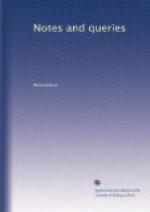It was “Printed at London by E.A.,” i.e. Edward Allde, without date; and it may have been duly noticed by the last editor of The Complete Angler. However, neither this nor Heber’s MS. throw any new light upon the small tract (in 8vo., and of perhaps not more than two sheets) with the title of which I commenced, and regarding which I request information. It is a poem in eight-line stanzas, and it is dedicated, at the back of the title-page, “To his honourable Master, Sir Richard Wenman, Knight,” without another word addressed to his patron.
My fragment of four leaves, or half an 8vo. sheet, contains stanzas (one on each page), numbered 5, 6, 7, 8. 13, 14.; and the earliest of them is this:—
“To you I therefore
weepe: To you alone
I shew the image of your teares,
in mine;
That mine (by shewing your
teares) may be show’n
To be like yours, so faithfull
so divine:
Such as more make the publique
woe their owne,
Then their woe publique, such
as not confine
Themselves to times, nor yet forms from
examples borrow:
Where losse is infinit, there boundlesse
is the sorrow.”
I have preserved even the printer’s punctuation, for the sake of more perfect identification, if any of your readers are acquainted with the existence of a copy of the production, or of any portion of it. The above stanza, being numbered “5,” of course it was preceded by four others, of which I can give no account. Another stanza, from this literary and bibliographical rarity, may not be unacceptable; it is the eighth—
“Here then run forth
thou River of my woes
In cease lesse currents of
complaining verse:
Here weepe (young Muse) while
elder pens compose
More solemne Rites unto his
sacread Hearse.
And, as when happy earth did,
here, enclose
His heavn’ly minde,
his Fame then Heav’n did pierce.
Now He in Heav’n doth rest, now
let his Fame earth fill;
So, both him then posses’d:
so both possesse him still.”
Therefore, although Basse had written his Sword and Buckler in 1602 (if it were the same man), he still called his Muse “young” in 1613. I cannot call to mind any precedent for the form of stanza adopted by him, consisting, as it does, of six ten-syllable lines, rhyming alternately, followed by a twelve-syllable couplet. None of the other stanzas contain personal matter; the grief of the author of Great Britain’s Sun’s-set seems as artificial as might be expected; and his tears were probably brought to the surface by the usual pecuniary force-pump.
I have some notion that William Basse was a musical composer, as well as a writer of verses; but here, again, I am at fault, and particularly request the aid of Dr. Rimbault, who has paid special attention to such matters, and who has just published a learned and valuable work on the music of the ballads in Percy’s Reliques. If the volume were not so indisputably excellent in its kind, there are reasons, connected with its dedication, which might make me hesitate in giving it even a just tribute of praise.




